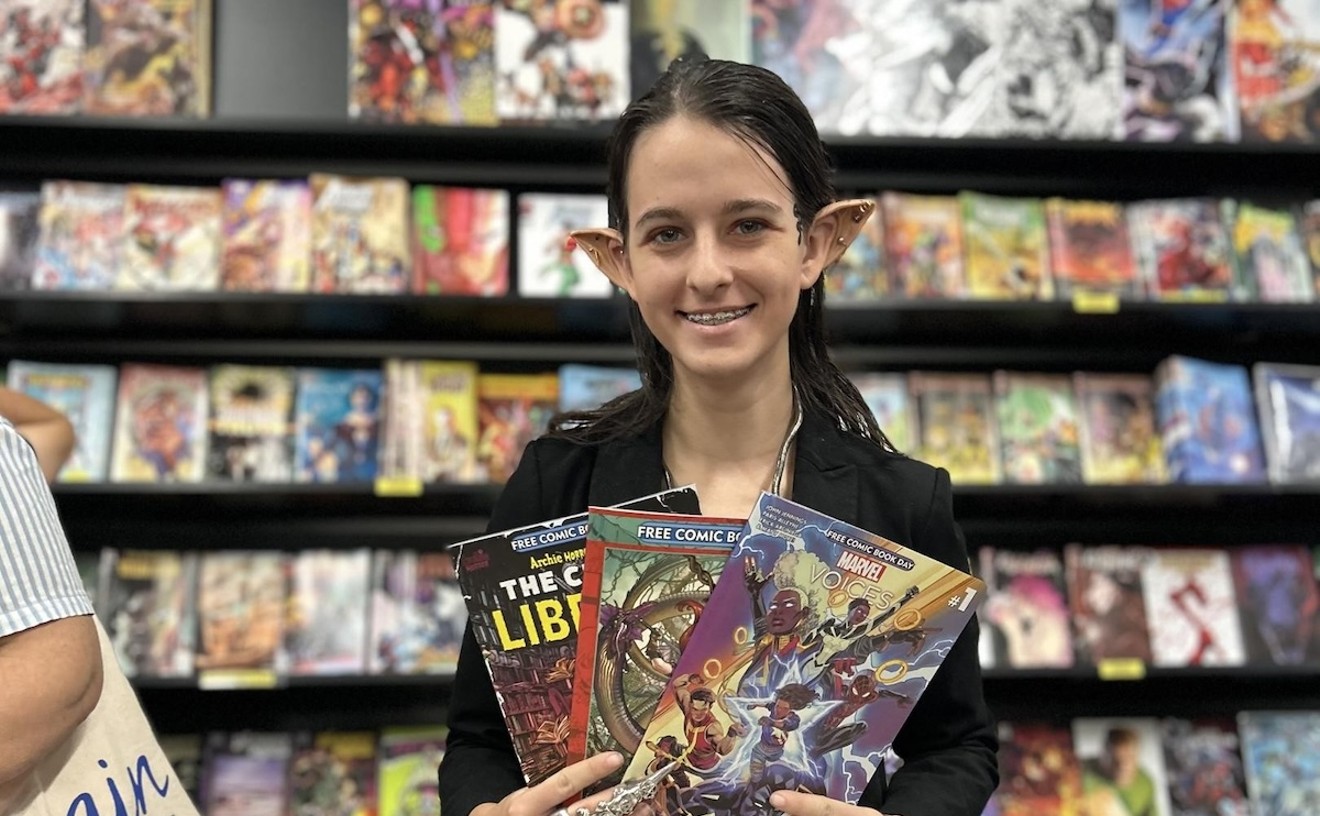The person making such excuses is safe until some genius comes along and executes the previously "impossible" act. For those individuals who see limitations and believe in them, greatness never will arrive.
Lately the fashion has been to use the public as an excuse. "It's impossible, and besides, the public won't buy it" is heard regularly. The public doesn't want quality television. The public wants only moronic movies with pointless action and formulaic plots. The public doesn't read or think.
These excuses work for publishers, movie producers, directors, and writers until an excellent and entertaining book such as Caleb Carr's The Alienist comes along and takes flight on the bestseller list. Or until a movie such as Robert Altman's The Player or the recently released Forrest Gump temporarily knocks out the usual suspects at the box office. The public is neither stupid nor ill-educated, and when people discover the real thing they respond in great numbers.
Looking at the upcoming fall season for some major South Florida theaters, a critic could become disillusioned. Bland revivals, mediocre versions of contemporary dramas, and boring musicals/sit-coms are once again flooding the playing field and crowding out creativity. And the same old irritating, transparent excuses are being trotted out: Audiences want this kind of fare; South Florida doesn't like serious drama; the region isn't ready for new playwrights and new experiments.
Well, that's bull. South Florida audiences and critics are not prepared to celebrate second-rate work just for the sake of building a theater community. They crave great art or at least admirable attempts at it, and the painful fact is that few artistic directors around here seem capable of providing anything close to it.
Arnold Mittelman of the Coconut Grove Playhouse serves as the perfect case in point. Year after year he serves up pleasant, pedestrian fare in his 1100-seat house, explaining that he has to cater to a mass audience. At a recent luncheon he held to announce the Playhouse's upcoming lackluster season, Mittelman bemoaned the fact that theater audiences don't know how to dress correctly any more, and that "we are losing people 35 and under." In Seattle, Georgia, Minneapolis, New Jersey, and Milwaukee, many young people attend the theater. Maybe they don't wear expensive clothing, but they bring their brains. They attend because the works they're seeing are exciting, relevant, and unexpected.
Therefore, before I allow Mittelman to blame local theater's problems on incorrect apparel and youthful delinquency, I would like to examine his upcoming season:
1) Opening show, The Bermuda Triangle, written by and starring the comedy team of Renee Taylor and Joseph Bologna. Set in a South Florida condominium, the play concerns two widows who share a boyfriend. Mittelman describes it as a "funny play with poignancy," concerning "older people and their love lives."
So the Coconut Grove Playhouse is losing young people? Small wonder. Taylor and Bologna are scarcely known by the under-40 crowd, their humor is out-of-date, and the plot itself is an obvious ploy to sell tickets to an aging audience, many of whom reside in South Florida condos. "For the sake of the work, I create," Mittelman said over lunch. I say he creates for the sake of the sure buck.
2) Followed by Double Act, a two-character piece (read: cheap to produce) that has the dubious reputation of being "a big hit in Paris," a city known for its love of Jerry Lewis and not known for much contemporary dramatic appreciation. Because the play concerns a divorced couple's second fling at love, it sounds like the type of crowd-pleasing romance that may sell well if the production is worthy. Whatever, it certainly lacks substance.
3) After pandering to an older audience, divorcees, and other ticket-buyers Mittelman carefully calculates will attend anything just to get out of the house, he'll attempt to rope in the Cuban population with Rafael Blanco's The Fall, which addresses the fall of Castro and its effect on Miamians. The artistic director has long voiced a desire to attract Latin audiences, but he consistently attempts to do so with grade-B, family-based sit-coms about the Miami-Cuban situation.
From what I hear, Blanco, who has worked for the Playhouse for more than a decade (mostly as a stage manager), has labored over this previously mediocre piece since it appeared at Teatro Avante last year. I hope so. The draft I saw was fun yet flawed and inconsequential, and it didn't merit a production on the stage of a major regional theater.
4) A.R. Gurney's Love Letters, used by the Playhouse as a fundraiser twice in two years (for one evening each time), is the next scheduled show. This promises to be the highlight of the season, but it's also nothing South Florida audiences haven't seen before.
5) To fill the fifth spot, Mittelman claims he's trying to secure the rights for either Edward Albee's Pulitzer Prize-winning Three Tall Women or Arthur Miller's Broken Glass. Pardon me if I'm more than a tad skeptical. Every year a Playhouse spokesperson announces wonderful new plays that have "almost been signed." What they end up delivering instead is Nunsense 2 or a tribute to Pia Zadora.
6) For two years now Mittelman has been declaring that his final show will be the lavish musical The Rothchilds. I can't imagine how this entry will lure young people. And I will believe the show actually has been mounted only when I see it. The Playhouse has cried wolf on this entry too many times.
In the Playhouse's smaller Encore Room, the first show will be a musical revue called Havana, B.C. It's an attempt to please older people and Latins at the same time, in this case by highlighting Cuban songs of the 1950s. I can just envision the under-35 crowd beating down the doors to get into this one. As for the Encore's second entry, Mittelman says he's "negotiating" but hasn't indicated for what.
Before I'm accused of Playhouse-bashing let me add that few other theaters in the area will be offering anything better. The Actors' Playhouse, where artistic director David Arisco also complains about not selling tickets unless he produces familiar material, is also aiming for ticket sales rather than art. Included in the Actors' lineup are Evita, The King and I, Cat on a Hot Tin Roof, and two musical comedies, The Bialy Sisters and Six Women with Brain Death or Expiring Minds Want to Know. As far as I can see, the major artistic challenge presented to audiences by Arisco is to sit through some of these works a second -- or, in a few cases, a third, fourth, or fifth -- time.
ACME and the Caldwell Theatre Company continue to mount more creative works, but even these venues stick to recent hits and accepted "chic" plays such as Jeffrey and Someone Who'll Watch Over Me. They don't appear interested in commissioning a new work from a gifted young playwright or combing the country for an undiscovered gem.
So far the only theater that grows in stature, excellence, and dramaturgy each and every year is New Theatre, under the impressive artistic direction of Rafael de Acha. New Theatre's upcoming season is a critic's delight and should be both entertaining and enriching for audiences. The opening play, Sight Unseen, is a truly poignant piece about the lies told in the name of love; while the play enjoyed a fine production at the Caldwell 18 months ago, it's actually better suited to the New's smaller stage. Eugene O'Neill's weighty Long Day's Journey Into Night arrives next, a challenging classic that any director needs courage to stage properly because of its intense scenes and voluminous verbiage.
Also on the schedule: Lanford Wilson's intelligent and contemporary Talley's Folly, a relatively unknown work by Jeffrey Sweet called The Value of Names, and the season-closing Two Bears Blinking, a new play by noted writer Michael Brady.
As the perfect way to kick off this season, de Acha just scored a major coup by gaining the rights to Terrence McNally's recent hit, A Perfect Ganesh, about two American women who find spiritual adventure while on a tour of India. The play will be presented from August 6 through September 11, replacing After 5, a musical revue from the same team that created Relationships; the latter was a light entry that didn't particularly please New Theatre devotees when it debuted last month. As de Acha admitted to me in a recent letter, "Funny, our audiences have grown to expect only heavy-duty drama or a very special sort of high [Gurney, Coward] comedy from us."
I don't think it's funny. I think it's wonderful. And judging by the fact that McNally's agent gave the first Florida rights to New Theatre and that celebrated playwright Brady has chosen to premiere his most recent work at the New, the good word obviously has drifted up to New York. Rafael de Acha packs the houses and still manages to make artistic statements, in spite of a small space and a limited budget. This feat must not be impossible, after all.










